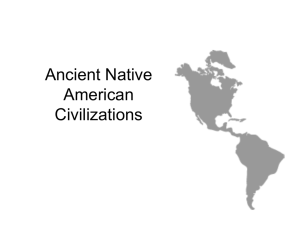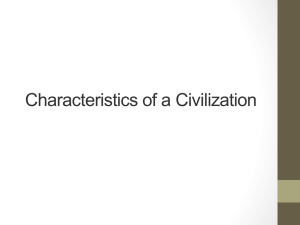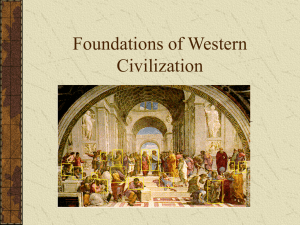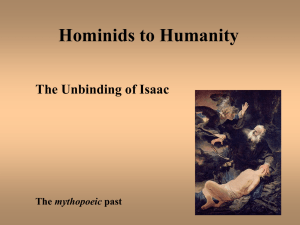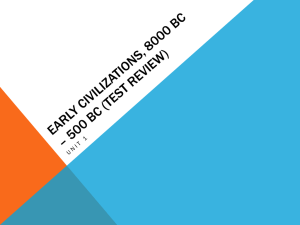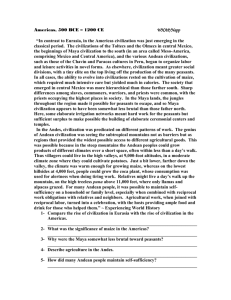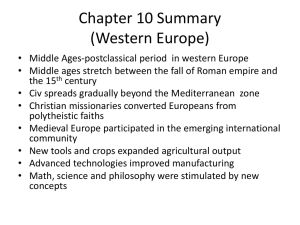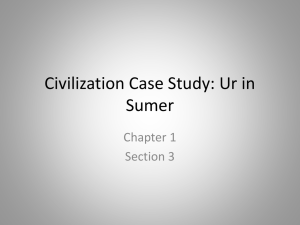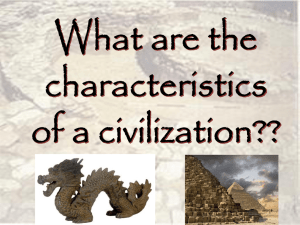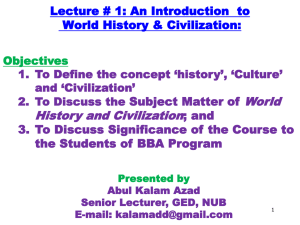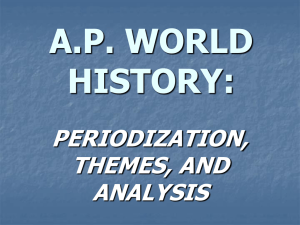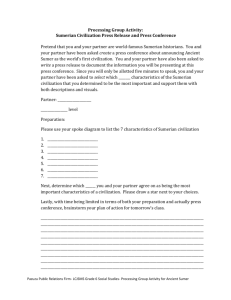Dawn of Civilization
advertisement
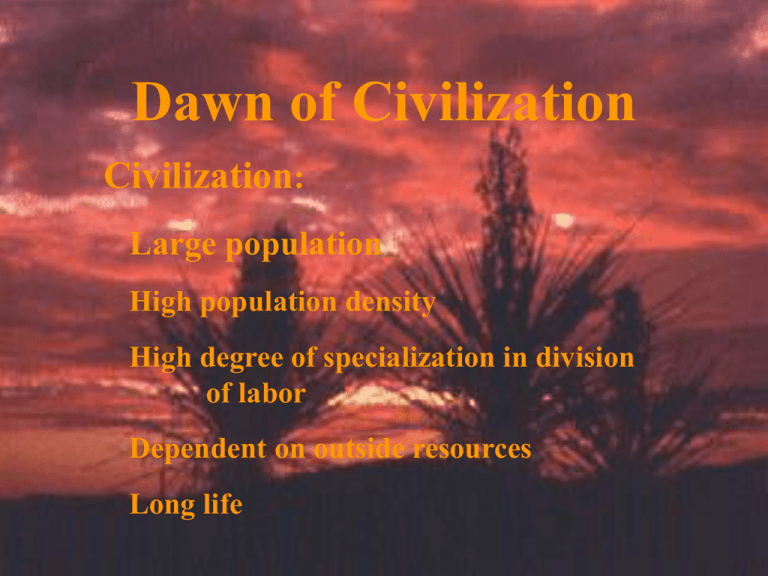
Dawn of Civilization Civilization: Large population High population density High degree of specialization in division of labor Dependent on outside resources Long life Dawn of Civilization Examples from Old and New Worlds Sumerian Civilization Olmeca revisited Maya Teotihuacán Dawn of Civilization Sumerian Civilization Developed in Tigris-Euphrates area of the “Fertile Crescent.” Early Phases: Early Dynasty 3200 - 2800 BCE Sumerian Proto-literate 3400 - 3200 BCE Ubaid Phase 3800 - 3400 BCE Dawn of Civilization The Sumerian Civilization Developed in Tigris-Euphrates area of the “Fertile Crescent.” Early Dynasty 3200-2800 BC (Full Civilization: Ur, Baghdad) Proto-literate Phase 3500-3200 BC (Early writing: Cuneiform) Ubaid Phase 3800-3500 BC (Large scale public works) Tell Arpachiyah (near Mosul) Cuneiform Writing History Cuneiform Begins at was Sumer: composed of pictograms, Thirty-Nine Firsts in Recorded History primitive forms representing easily recognizable images, (1981) Gradually, such as objects, Samuel animalsNoah andKramer human beings. the pictograms were simplified and became groups of The First Schools abstract Cuneiform writing was quickly adopted The Firstsigns. Bicameral Congress by Middle Eastern cultures. In Assyria, for example, The First "Moses" (Hammurabi) king Hammourabi used it to compose one of the first law The Pharmacopoeia codesFirst in history. Cuneiform remained in use until the 1st The FirstA.D. "Noah" century The First Tale of Resurrection The First Moral Ideals The First Biblical Parallels First Heroic Age (Gilgamesh) Dawn of Civilization Olmec Civilization Developed in Southern Gulf of Mexico in modern States of Vera Cruz and Tabasco Site of La Venta: (Located in floodplain of Tonala River) Late Phase 400 - 200 BCE Middle Phase 600 -400 BCE Early Phase 800 -600 BC Phase I –IISite established along N/S axis; major Phase – Flanker mounds added, entire site Phase III – Northern enclosure with small mounds; mounds established. covered with pink clay; basaltmasks; pavements; greenmonumental serpentine jaguar sculpture begins. figurine cache…. The Maya “Protocities” were important to the Maya during the Classic period from 300 to 900 AD. The Mayas were never a "true" urban culture; the urban centers were almost entirely used as religious centers for the rural population surrounding them. Mayans built incredibly sophisticated urban centers, an astronomical science and mathematics among the most sophisticated in the pre-modern world, and the most developed and complex system of writing in the Americas. The Maya The Temple of the Inscriptions is one of the most impressive buildings at the site. While excavating the room at the top of this structure in 1952, the Mexican Archeologist Alberto Ruz Lhuillier discovered a hidden chamber and a concealed stairway filled with rubble. It took four field seasons to follow the stairs 80 vertical feet into the pyramid. They terminate in a chamber 30 feet long by 13 feet wide with a high vaulted arch of 23 feet which contains the crypt of Pacal--the most important ruler at the site. The sarcophagus is famous for its sculpture of the tree of life and the afterworld journey of Pacal. A jade burial mask was found in the crypt Teotihuacán Teotihuacán was the sixth largest city in the world with an estimated population of 150,000 during its period of greatest prosperity, circa 600 A.D., when it occupied about 8 square miles. By the fourth century, unmistakable influences of Teotihuacán were felt throughout most parts of Mesoamerica and extended from the Great Lakes to the Inca area of South America.
